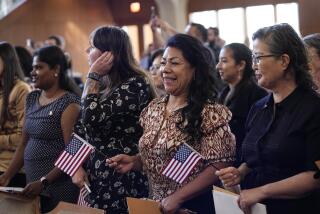Court Questions Suspect’s Label
A federal appeals court Monday sharply questioned the Bush administration’s decision to classify a U.S. citizen suspected in an alleged “dirty bomb” plot as an enemy combatant, thereby denying him access to legal counsel.
One member of the three-judge panel called the administration’s move placing Jose Padilla in military custody a “sea change in the constitutional life of the country.” U.S. District Judge Barrington D. Parker Jr. said the result could lead to changes that “have been unprecedented in civilized society.”
Padilla -- a 33-year-old, Brooklyn-born Muslim convert -- is accused of plotting with Al Qaeda operatives to explode a bomb containing radioactive material within the United States.
He was arrested at Chicago’s O’Hare International Airport upon returning from Pakistan in May 2002 and has been held in the U.S. Navy brig in Charleston, S.C.
The government Monday was appealing a ruling by U.S. District Judge Michael Mukasey that Padilla had the right to meet with lawyers and contest his status.
Parker said that he believed that the power to declare a citizen an enemy combatant rested with Congress, not with the president.
Judge Rosemary S. Pooler agreed, recalling the image of the World Trade Center on fire after the Sept. 11, 2001, terrorist attacks.
“If the battlefield is the United States, I think Congress has to say that, and I don’t think they have yet,” Pooler said. “As terrible as 9/11 was, it didn’t repeal the Constitution.”
Deputy Solicitor General Paul D. Clement, in arguing the government’s position, countered that the president has a “reservoir of authority to respond when the battlefield is in the United States.”
“There is no sea change here,” Clement said. The authority President Bush has used to hold combatants has been exercised, he said, “in virtually every military engagement in this nation’s history.”
Clement said that in the past, such suspects were held for intelligence purposes, “over and over again ... without specific authorization from Congress.”
Jenny S. Martinez, an assistant professor at Stanford University Law School who argued for Padilla’s right to counsel, said Bush was seeking “unchecked power to substitute military rule for the rule of law wherever and whenever he wants, without congressional authorization.”
“The Constitution demands that it be rejected,” she said.
Judge Richard C. Wesley, the third member of the panel, questioned why the Padilla case was being heard in Manhattan. “This should be litigated in South Carolina,” he said.
The judges are not expected to issue their ruling for weeks and could transfer the case to another court.
“Here we have a situation where an American citizen was picked up on a material witness warrant [and] brought into this district,” Parker said.
“In the course of litigating his detention, two delegates from the Department of Defense showed up and took him to Charleston.”
“As far as I can see, that ... is unprecedented,” the judge said.
“Isn’t this as unusual as it gets?”
More to Read
Start your day right
Sign up for Essential California for news, features and recommendations from the L.A. Times and beyond in your inbox six days a week.
You may occasionally receive promotional content from the Los Angeles Times.






